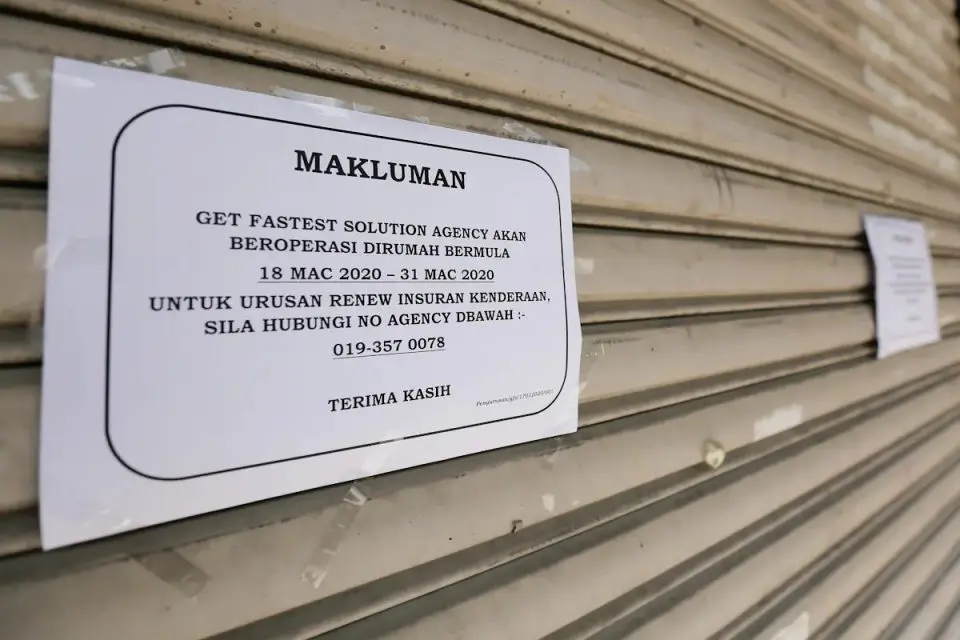KUALA LUMPUR, May 4 — For businesses that were badly hit by the enforcement of the movement control order since March 18, the easing of restrictions from today is most welcome.
Business activities considered non-essential came to a halt for more than a month after the MCO was enforced to curb the spread of Covid-19.
In his Workers Day address on May 1, Prime Minister Tan Sri Muhyiddin Yassin announced the implementation of the conditional movement control order (CMCO) from May 4 which will allow most businesses to resume operations but subject to strict compliance with standard operating procedures (SOPs) set by the government.
While Malaysia’s efforts to fight the pandemic have borne fruit as it is now in the recovery stage, the closure of businesses has undeniably had a negative impact on the economy and the implications may be severe if it is left unaddressed.
According to the prime minister, Malaysia was losing an estimated RM2.4 billion daily since the MCO was enforced on March 18 and that so far it has incurred an estimated RM63 billion in losses. He said it will lose another RM35 billion if the MCO is extended for one more month.
To explain it in simple terms, take the example of a trader operating a small enterprise who is forced to close his premises due to the MCO. His cash flow comes to a halt as there is no source of revenue. He cannot afford to pay wages to his workers who, additionally, are at risk of losing their jobs if their employer winds up his operations.
In its efforts to counter the effects of the unprecedented crisis confronting the nation, the government is giving incentives and cash handouts to businesses and people affected by the pandemic but there is only so much it can do.
How long can the people continue depending on government aid or on their savings which is depleting fast?
Sharing his views, senior lecturer at the Centre for Economic, Finance and Banking Studies, Universiti Utara Malaysia, Muhammad Ridhuan Bos Abdullah said the implementation of the MCO to prioritise the safety of the people came at a considerable cost to the economy.
However, he said, if there was no such restriction on movements, Malaysia might have experienced an exponential rise in infections, similar to what happened in the United States where rising costs to curb the pandemic are having a large-scale impact on national spending.
Muhammad Ridhuan Bos said the CMCO will help to stimulate and restore the chain of domestic economic activities.
“In the short term, we will see interactions between economic agents, namely producers, individuals, households and the government through transactions involving the purchase of goods and services.
“This will have a positive effect on the wholesale and retail, food and beverage, and logistics sectors,” he told Bernama.
Consumer spending accounts for 60 per cent of the nation’s Gross Domestic Product, he said, adding that the gradual growth of economic activities will enable the tourism, airline and other sectors to recover.
In the long term, he added, the CMCO has the potential to step up the velocity of money, which refers to the people’s spending capacity.
He also said that the reactivation of the economic chain will indirectly contribute to job guarantee, reduce the risk of unemployment and renew the confidence of manufacturers.
Muhammad Ridhuan Bos said the International Monetary Fund, in its World Economic Outlook 2020, has urged nations to prepare to face the economic downturn induced by the Covid-19 crisis through the implementation of fiscal policies that include extending aid to households and businesses.
“To ensure there is no prolonged suffering as a result of the crisis, other rational measures should also be implemented, including taking the necessary action in response to views expressed by groups and stakeholders adversely affected by the crisis,” he said.
Having said that, any decision taken by the government to counter the first-of-its-kind crisis is bound to be laced with risks, as well as elicit a fair share of support and opposition from various groups.
The concern over loosening movement restrictions and opening up more business sectors under CMCO is legitimate as Covid-19 is a life-threatening disease and Malaysia has yet to win the war against the virus.
But being overly anxious about the disease will not help to improve the situation. In fact, it is not an exaggeration to say that some Malaysians are not on the same wavelength with the government insofar as countering the challenges posed by the pandemic is concerned.
Should the nation choose to “surrender” to the Covid-19 situation and, thereby, paralyse its economic, social, education and other sectors, what will happen to the country? It will surely head to its doom.
The government has made it clear that the implementation of CMCO does not mean that the health and safety of the people will no longer be a priority.
More importantly, CMCO is not a ticket for the people to return to their old lifestyles. Any activity or movement permitted under CMCO is subject to compliance with strict SOPs and action will be taken against those who flout the rules.
In short, the CMCO can be likened to killing two birds with one stone – revive the economy and reduce Covid-19 infections. Wherever they are, Malaysians must commit themselves to practise self-regulation, that is, observe social distancing and self-hygiene such as wearing a face mask in public areas and washing their hands frequently in order to reduce the risk of infection.
— Bernama





